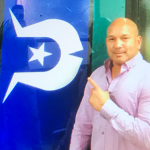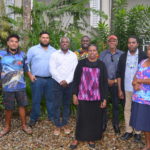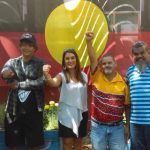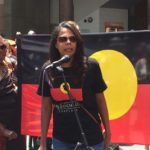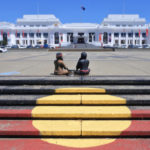Towards Torres Strait Autonomy: An Interview With GBK’s Ned David
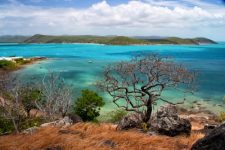
Greater autonomy for the Torres Strait Islands has been on the agenda for decades. However, right now, the momentum to see First Nations governance of the 270-odd islands in the strip of water north of Cape York is building.
Three weeks ago, an unprecedented forum was held on regional autonomy. Hosted by the Gur A Baradharaw Kod Torres Strait Sea and Land Council, the meeting included representatives from the prescribed body corporates throughout the Torres Straits, as well as guests from outside the region.
Australia’s first Indigenous silk Tony McAvoy was in attendance, along with Aboriginal and Torres Strait Islander Social Justice Commissioner June Oscar, Flinders University Professor Daryle Rigney and Canadian Indigenous Law Professor John Borrows.
Catalysts for change
As Torres Strait-based journalist Aaron Smith set out in NITV News, there’s been calls for greater autonomy in the region going back as far as 1937 with the first island council meeting in Masig. First Nations leaders at the meeting put autonomy front and centre.
And in 2014, a number of Torres Strait representative bodies launched the “One Boat” strategy, which had the aim of creating a single regional governing body that would put local decision-making firmly in the hands of Indigenous peoples.
Of course, the Torres Strait is no stranger to bringing about pioneering change. In 1982, Meriam man Eddie Mabo registered a claim over land on Mer Island. And a decade later, the High Court of Australia recognised Mabo’s native title and overturned the legal fiction of terra nullius.
Rising sea levels
On 13 May, eight Torres Strait Islander representatives from four islands lodged a complaint with the UN Human Rights Committee against the Australian government over its lack of action on the climate emergency.
While some on the mainland may have the luxury to debate whether climate change is real, people living in the Torres Strait are experiencing its impact daily with rising sea levels and harsher weather. Last year, people on Yama Island found themselves homeless due to the harsher conditions.
The UN complaint asserts that the Coalition government’s inadequacy regarding the climate emergency means that it’s neglecting its human rights obligations. And significantly, this is the first time the inhabitants of low-lying islands have brought legal action against a nation-state.
First Nations governance
The Gur A Baradharaw Kod (GBK) Sea and Land Council supports the UN complaint. Formed in March 2012, the GBK is the peak native title body for the Torres Strait. It’s chaired by Ned David, who’s a Kulkalaig man from Tudu (Warrior) Island: one of the Central Islands of the Torres Strait.
Sydney Criminal Lawyers spoke to Mr David about his vision of greater autonomy for the Torres Strait, why it’s vital the Australian government immediately takes crucial action on climate change and how he has no problem seeing Tahiti.
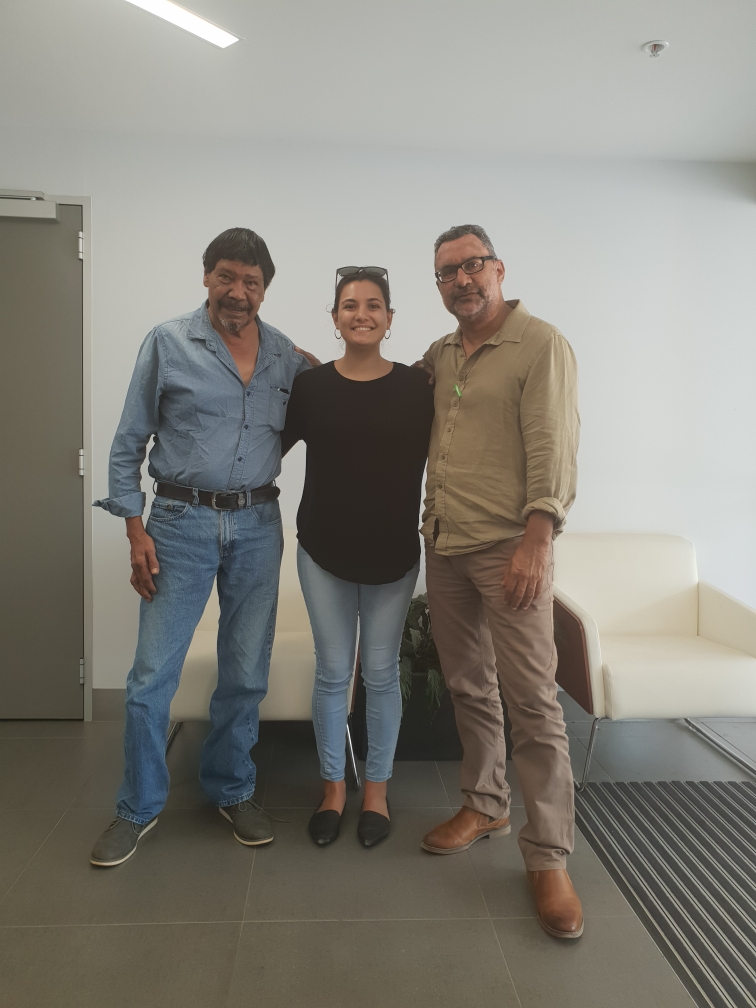
A few weeks back, the Gur A Baradharaw Kod held a forum in the Torres Strait on regional autonomy. Mr David, what would greater autonomy look like in the Torres Strait? And how would this differ from what’s in place now?
The aspiration has always been we would have three streams: self-government, self-management and self-determination. It’s an enhanced model of what we already have in place.
More importantly, we need the right people making decisions. By that I mean, when it comes to land, sea and anything in that space, we think the right people would be the traditional owners: the First Nations people.
We have a model of that already with the native title prescribed body corporates (PBCs). We’ve got traditional owners, who speak for their place. As our Aboriginal brothers and sisters would say, “Who speak for country.”
And we also have some models of the colonial constructs, such as local government and regional government.
The conversation would lead to some form of fusion between what already exists: the administration and the bureaucracy, and the Westminster-type model of electing representatives, accommodating the traditional owner interests. From a traditional owner point of view that would be the preferred model.
In all our conversations, we’ve said it’s very important to get the structure and the governance right.
But, at the same time, it isn’t going to mean anything if it doesn’t ensure that the service provisions are more efficient and effective. How we ensure we get quality education. How we ensure that health services are meeting needs. And how we provide proper genuine housing.
Those sorts of things need to be prioritised within that model. It’s not just about the traditional owners being in charge. It has to be a proper and reasonable approach to how we enhance all those things. It needs to be a step up and not a step sideways, as it has been in the past.
Along with the chairs from 21 PBCs from around the Torres Strait, you also had representatives from Aboriginal nations at the forum. What sort of progress did you make at the meeting?
A key thing that came from having our Aboriginal brothers and sisters and an international speaker was it opened up the conversation to other ideas. But, more importantly, it reaffirmed that we are on the right track.
That’s what came very strongly from June Oscar and Daryle Rigney. The strong message that came from both of them is that they look to the Torres Strait, where certain things have been achieved against insurmountable odds. Eddie Mabo is an unbelievable example of that.
Plus, we have a number of things in place that don’t necessarily exist anywhere else in Australia.
We’ve got the Torres Strait Regional Authority, which is a Commonwealth statutory authority. It continues to be the only remnant of ATSIC still functioning. And its confirmation that we can have something like that in place that works. Of course, we believe it can work much better.
Tony McAvoy is someone who has talked about sovereignty and independence. He’s tried to reshape the conversation between non-Indigenous and Indigenous people, with what it would mean to recognise, respect and give First Nations Australians a genuine place in running their affairs.
We’re reusing a phrase now, “What does your Tahiti look like?” It’s around someone from Hawaii, who wanted to sail to Tahiti using the old ways: the old navigation skills and boats.
This gentleman asked an elder in Hawaii, “Can you help me do this? Because you are the only person in Hawaii that I know that still has the knowledge of how to build those boats. And more importantly, you know how to navigate using the old methods that Hawaiians are known for worldwide.”
And this old fella said to him, “Can you see Tahiti?” To which the guy said, “No, I can’t.” And he said, “Well, you come back and talk to me when you can see Tahiti.”
Over a number of years, this guy visited the elder, who kept asking him whether he could see Tahiti. It wasn’t until such time that in his sleep this man dreamt about Tahiti and he went back and said, “Yes, I can see Tahiti.” And the elder said, “Well, now you are ready to go to Tahiti.”
And that story comes to where we are. “Can you see your greater autonomy? Can you see where Torres Strait is in that space? Until you see what that looks like, you’re not ready.”
So, we use that phrase now. We can see what Tahiti looks like for us. And we can see what Torres Strait looks like with a much more appropriate governance and what that will do for our future generations and what that will do for our communities now.
Tony McAvoy brought that nice little message to the conversation and the forum. And it strengthened and reaffirmed that we were not just having a talkfest or a meaningless conversation.
This is about a journey that started quite some time ago, during the time of our forefathers, in 1936-37. And we’re just continuing that journey.
And what are some of the specific challenges you face in bringing this about?
One is having a genuine conversation amongst ourselves. And setting some key principles that we’ll all sign up for. That’s probably the biggest hurdle, because we all talk and aspire for this thing called greater autonomy. And we all agree that there are some things that are quite possible right now.
But, what we don’t agree on is how we get there, when we get there and who should be taking us there. That’s one key challenge.
The other is how we develop a plan to have a proper conversation and negotiations with the state and Commonwealth.
Last month, a group of Torres Strait Islander representatives lodged an official complaint with the UN Human Rights Committee against the Australian government over its lack of action on climate change. The GBK supports the complaint.
What sort of outcome are you hoping will follow from this?
The biggest one is the level of awareness: the impact of what’s happening with the climate right here in Australia.
It’s happening in these islands that are part of Australia: the Torres Strait, our homeland. We want to shine a spotlight on the responsibility and the duty of care that Australia has for First Nations Australians living in the Torres Strait.
We know that it will probably be really tough for the UN to call the Australian government into action. But, we do understand that it creates that level of awareness so that people in general – Australians and others internationally – can hold Australia to account.
It’s about creating that level of awareness where you develop policies, rules and legislation around emissions that are impacting your constituency directly.
And we have evidence of this. There are things that are happening in our waters now that are preventing us from doing a range of different things.
The worst-case scenario for anybody – whether that’s in Australia, the Pacific or elsewhere – is if we don’t do something soon, we might have to leave our homeland and go and live somewhere else.
There is no better time to take this sort of action than now.
The Torres Strait Islands fall under Australian jurisdiction. But, the UN complaint shows that government response to the region’s needs when it comes to climate change is lacking.
What would you say the overall response from the Australian government is to the needs of Torres Strait Islander communities?
They do what they can. They try. There hasn’t been inaction. There certainly has been monies for resources for seawalls and a number of construction developments around our communities.
Our position is there should be more done. Not just money to build seawalls. But, there should be some more attention to how we address some of the commitments we gave, whether that was in Kyoto or Paris.
And also on how we need to be aware as a nation, that when our governments make decisions around these kind of things, there’s a direct impact on Australians. We are probably the more vulnerable group given our low-lying communities.
What sort of a role does the Gur A Baradharaw Kod play in the Torres Strait?
We’re the collective voice of all the First Nations groups in the region. Our primary goal is to protect the interests of our constituents, as well as ensuring we support each other.
The advocacy role we play in that space is to ensure the traditional owner-First Nations voice is respected and recognised.
We want to give the right people that place where they make the decisions – that they have that rightful authority to talk on behalf of First Nations people.
We don’t subscribe to supporting any notion that the western construct models are the right people and the right players to talk on our behalf.
We continue to try and ensure that we empower our people – the right people – to make decisions and speak on our behalf, whether it’s within our communities, our region, our state, nationally or internationally.
That’s the primary function of the GBK. And we are slowly growing. We are now involved in a joint venture with one of the city providers trying to make sure that programs and strategies are in place to address the massive unemployment issue that we have in the region.
We fully understand that this is not the easiest of tasks – to have a plan that is going to address that situation. And we are not the only ones in the country who have that issue.
But, we are the right people to make sure that our people are given the chance to choose a career pathway and more importantly, achieve their aspirations, whether it’s to be a gardener or a pilot. That’s what we want to do.
And lastly, Mr David you held the regional autonomy conference last month. And it was a success. What’s the next step for the GBK and indeed for the region in bringing about greater independence?
We’ve got to agree. And when I say we, I mean every player in this space: all the stakeholders who have an interest in governance and representing the interests of the region.
The first step is we need to get them into a room around a table and agree on some key principles: how we are going to work collectively to deliver on this aspiration. That is the next thing we need to do. And we need to do that very soon.


